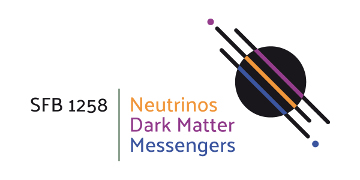N02 - Neutrino mass and mixing: at the intersection between IceCube and JUNO
From oscillation experiments we know that neutrinos have non-zero masses: The SuperKamiokande-Experiment in Japan (1998) and the Sudbury Neutrino Obervatory (2002) were the two experiments presenting the first compelling evidence that the flavor of neutrinos can change when travelling through space and thus that neutrinos have mass. In 2015, The PIs of the two experiments were awarded the Nobel prize in physics.

The neutrinos show up in three flavors, electron-, muon-, and tauon-neutrinos that are quantumechanical superpositions of three fundamental neutrino mass eigenstates m1, m2, and m3 with a mixing matrix parametrized with three mixing angles. The mass eigenstates can be in principle determined by astrophysical observations or via experiments involving low energy weak decays, like Tritium decay or electron capture, or the neutrinoless double beta decay. Currently, only upper limits for the Neutrino masses are known: the Tritium decay experiment KATRIN established that the effective neutrino mass must be less than 0.8 eV, combined neutrinoless double beta decay experiments calculated the upper limit for the effective Majorana mass to be below 0,07 - 0,16 eV.
Whereas absolute neutrino masses are still unknown, the three mixing angles as well as two squared neutrino mass differences ∆m212 and |∆m312|, (∆mij2 = mi2 − mj2 ), are known with increasing precision from neutrino oscillation experiments. From this results it is clear that m1 and m2 are close to each other, but m3 either weighs much more or much less than the other two. The open question of the correct mass ordering of the three eigenstates is known as the neutrino mass ordering problem.
As the challenging efforts to measure the absolute neutrino masses are ongoing, project N02 remains focused on the experiment JUNO and IceCube and their combined potential to extract presion measurements of neutrino mixing and to shed light on the mass ordering.
Caldwell, Allen
Ha Minh, Martin
Oberauer, Lothar
Resconi, Elisa
Stock, Raphael


